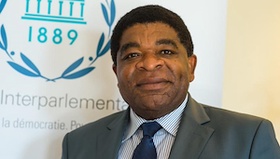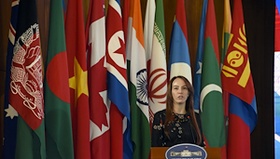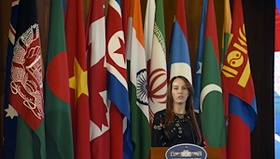We, Speakers and members of parliament from the Asia-Pacific region gathered in Ulaanbaatar, Mongolia, from 27 to 28 May 2019 for the Regional Seminar “Advancing the Sustainable Development Goals for People and the Planet”. The Seminar was jointly organized by the State Great Hural of Mongolia and the Inter-Parliamentary Union (IPU).
The seminar built on the conclusions of our previous regional seminar held in Viet Nam in 2017 and examined additional issues that are crucial in attaining the Sustainable Development Goals (SDGs) in the region. We welcomed the active engagement of all participants as they shared their lessons learned, and benefited from the rich contribution of parliamentarians, Government representatives, United Nations experts, the IPU and civil society.
With only 11 years left to implement the SDGs, we are cognizant of the fact that a real transformation can be achieved only by prioritizing those left behind. During the seminar we examined practical steps parliaments could take to institutionalize the SDGs in our respective countries and in the region as a whole. Particular emphasis was placed on heightening understanding about how parliaments could institutionalize the SDGs, promote convergence between the 2030 Agenda for Sustainable Development and national action plans and build coherence around the SDGs at the policy level.
Our discussions further highlighted the interconnected nature of the SDGs and addressed the following questions: what practical steps can parliaments take to support the implementation of the SDGs in our countries and in the region; how can parliaments advance their national health agenda and improve access to healthcare for women, girls and other marginalized and vulnerable populations; how can parliamentarians promote “environmental literacy” and increase awareness on climate change and disaster risk reduction; and how can parliamentarians ensure access to high quality data in order to measure and monitor progress towards the SDGs?
We proactively engaged on these issues and drew up the following strategies, actions and recommendations to advance parliamentary engagement with the SDGs in the Asia-Pacific region:
The SDGs are a groundbreaking universal framework that is intended to help focus and coordinate national policies towards an all-inclusive development from the economic, social and environmental perspective. The SDGs also provide a platform for cooperation and dialogue. We commend the development gains our countries have made and are also aware of the strong engagement that is still required to ensure that the SDGs will be effectively achieved by 2030. According to United Nations data, the region is lagging behind in SDG implementation with no country currently on track to achieve the SDGs. We need to do things differently to make a difference, and political commitment and an inclusive approach are imperative in this regard.
In order to contribute to this transformation, each Parliament needs to examine its capacities to deliver on the SDGs as soon as possible, and identify its own priorities and strategic actions. Knowledge and awareness raising on the SDGs should be enhanced within parliaments through trainings and seminars so as to ensure that parliamentarians and parliamentary staff can strengthen their competences and take informed decisions on the practical steps they should put in place to advance the implementation of the goals and monitor progress.
The IPU/UNDP SDGs Self-Assessment Toolkit has proved an important catalyst for parliamentary action on the SDGs and we congratulate the parliaments that have undertaken the self-assessment exercise. We appreciate the commitment shown by several parliaments from the Asia-Pacific region to translate the IPU/UNDP SDGs Self-assessment Toolkit into their national language so as to enhance the sense of national ownership and raise further awareness about the SDGs in parliaments. We strongly encourage all parliaments to use this toolkit in order to identify the most suitable mechanism for their engagement in SDGs implementation.
Each parliament has to find effective ways to hold government accountable for the goals they have subscribed to, and to ensure that enabling laws are passed and budgets are adopted. Parliament’s oversight function is one of the bases of democracy. Oversight mechanisms, such as parliamentary questions and committee hearings, inquiries and reports, are important tools for assessing the concrete impact of government policies and programmes. Appropriate means for coordination should also be identified through the self-assessment exercise in order to ensure that the SDGs are transversally and comprehensively integrated into the work of parliament.
We stress the importance of taking measures to ensure that gender equality is adequately taken into account in a cross-cutting manner and that SDG-related policies and programmes reflect the specific needs of the poor, marginalized and vulnerable groups. As elected representatives of the people, members of parliament have an important role in reaching out to and engaging marginalized populations. Parliamentarians also have important responsibilities in ensuring that public policies are informed by the citizens whose lives they impact.
We believe that women’s equal participation in politics is essential not just because it could ensure that our parliaments are more representative and inclusive, but also because gender equality is essential for democratic governance and for the achievement of the SDGs. As we celebrate the increasing number of women in our parliaments, we express concern that progress is stagnating and there is a need to make substantial efforts to ensure that our institutions will adequately represent the composition of our societies. We urge all parliaments to increase women’s participation in every aspect of legislative work with a view to attaining gender equality and parity in politics and in parliaments by 2030.
We believe that quality, accessible, timely and reliable disaggregated data are essential for measuring progress against the national priorities that we have defined. Each country needs to constantly update and improve its statistical capacities to collect and process data, including in relation to identification of marginalized populations and programming for the poor.
As noted in the Doha Declaration adopted at the 140th IPU Assembly, education is a fundamental human right which provides individuals with tangible skills that not only enable productive employment, but also develops life skills that foster civic engagement and guarantee social cohesion based on common values. We acknowledge that ensuring quality education is central in the achievement of all SDGs and in breaking the cycle of poverty. We are committed to supporting mechanisms and financing measures that work towards promoting quality education and enabling equitable access to education for all.
We recognize that the health and well-being of citizens is central to the attainment of the SDGs. Parliaments should take action to advance national health agendas and promote the mainstreaming of health within national development plans and strategies. We acknowledge that health services and healthcare facilities must cater to the needs of all citizens, including women, girls, adolescents, and other vulnerable and marginalized populations. Despite progress in the region on maternal and child health, access to HIV treatment and prevention, and access to sexual and reproductive health services, there is a need for stronger laws and policies, as well as stronger enforcement, to address the persisting social and financial barriers that restrict equity in access to healthcare. Furthermore, parliaments are encouraged to invest in educating citizens about health, in particular, that of children and young people.
We support efforts to build political will and strengthen commitment to Universal Health Coverage (UHC) and sustainable health systems. Members of parliament have an important responsibility to insist on providing quality data that identify the marginalized and underserved groups and adopt legal frameworks that support access to quality health services and financial protection for all. Health crises and emerging health threats in relation to climate change in the Asia-Pacific region have shown that resilient health systems are necessary for the prevention and response to disease outbreaks.
Climate change presents a serious threat to human health and well-being, and threatens the development gains in the Asia Pacific region. Thus, it is important we build a culture of prevention and promote transition to a low-carbon, resource-efficient and socially-inclusive economy. In particular, parliamentarians should promote “environmental literacy” and increase awareness on climate change and disaster risk reduction among citizens. In order to do so, they need to maximize their roles as legislators and overseers, and enhance cooperation and partnerships with a view to sharing information and experiences on a regional and global scale.
Disaster risk and environmental degradation present important challenges to our region and therefore need to be part and parcel of the parliamentary engagement on climate change and national education programmes. We need to ensure that legislation protects the environment and that prevention measures are included in the budget to avert the impact of climate change and natural disasters.
Parliaments in all countries should play an active role in preparation and oversight of the Voluntary National Report to the High-Level Political Forum (HLPF). Parliaments should also be represented on the national delegation to the HLPF in order to further strengthen the ownership of the report and facilitate the engagement of parliament in follow up to the results and recommendations.
In order to inspire action on the SDGs, we will bring this Outcome Document to the attention of our parliamentary colleagues through all possible channels. We also undertake to bring it to the attention of other relevant stakeholders.
We request the IPU and the State Great Hural of Mongolia to bring our conclusions and recommendations to the attention of the global parliamentary community at the 141st IPU Assembly in Belgrade, Serbia. We urge the IPU to promote parliamentary engagement with the SDGs and to continue to work with the United Nations and other relevant partners towards the successful implementation of 2030 Agenda for Sustainable Development.

 Мон
Мон  English
English

